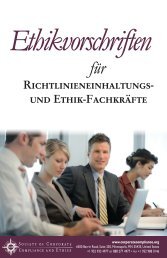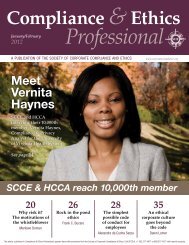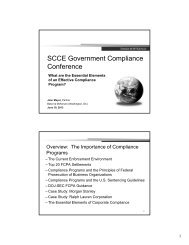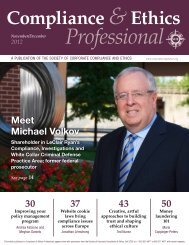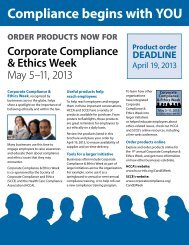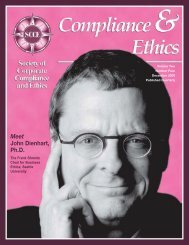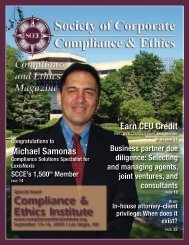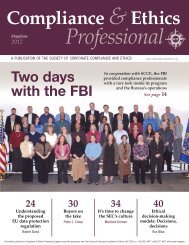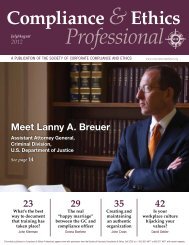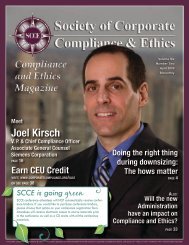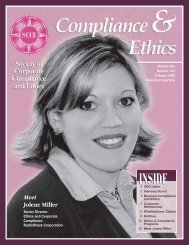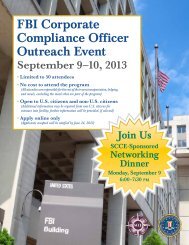Compliance & Ethics Professional - Society of Corporate ...
Compliance & Ethics Professional - Society of Corporate ...
Compliance & Ethics Professional - Society of Corporate ...
- No tags were found...
Create successful ePaper yourself
Turn your PDF publications into a flip-book with our unique Google optimized e-Paper software.
<strong>Compliance</strong> & <strong>Ethics</strong> <strong>Pr<strong>of</strong>essional</strong> March/April 2012“It is important toremember that eachissue <strong>of</strong> a publication isa separate work entitledto a separate award <strong>of</strong>statutory damages.”My practice mainly involves representingelectronic newsletters, but a wide variety <strong>of</strong>works can give rise to serious copyright liability.For example, in one recent case an insurancebroker was found to have secretly copied a rival’sbusiness materials to make a series <strong>of</strong> successfulbusiness proposals. Instead <strong>of</strong> statutory damages,the plaintiff demanded the pr<strong>of</strong>its earnedby this infringement, plus interest covering thedecades before the infringement was discovered.Tens <strong>of</strong> millions <strong>of</strong> dollars were awarded.Another case involved copies <strong>of</strong> instructionsand advertising for storm windows. Theinfringers were former authorized distributors.Their failure to make a defense resultedin a default that was held to establish willfulinfringement. The court held that two registeredworks had been infringed and awarded$31,000 per work in statutory damages.These numbers are high because <strong>of</strong> a specialremedy in the law to implement the strongpublic policy in support <strong>of</strong> copyright compliance.Under the “statutory damages” provision<strong>of</strong> the Copyright Act, a court is not limited byactual damages, but may award up to $150,000in statutory damages for each work the defendanthas willfully infringed. For non-willfulinfringement, the law identifies a range <strong>of</strong>statutory damages, depending on the circumstances,<strong>of</strong> up to $30,000 per work (with a floor<strong>of</strong> $750 per work in most circumstances).In addition, a winning plaintiff may alsobe awarded its legal fees in bringing thecase. The public policy underlying statutorydamages reflects the reality that it is extremelydifficult for a plaintiff to see copyrightinfringements in most cases, because theyhappen behind closed doors; thus, when aninfringement is discovered (sometimes by accident,sometimes through whistleblowers, andsometimes in other ways), through this seriousremedy the law wants to ensure that copyrightholders do not lose the incentive provided bycopyright to create and distribute new worksmerely because <strong>of</strong> infringers’ secrecy.Courts are not shy about using the power<strong>of</strong> imposing statutory damages. I recentlydid a simple computer search for 2008–2011cases reporting copyright statutory damagesawarded by juries. I found about a dozensuch cases, involving all sorts <strong>of</strong> copyrightedworks. In two cases the juries had awardedthe maximum <strong>of</strong> $150,000 per work, and in athird the jury had awarded $140,000. The averageacross the dozen cases was about $75,000per work. Willfulness was found in almost allcases. The lowest award was $15,000 per work,and that was in unusual circumstances wherethe employer could not have known that anindependent contractor had been infringing.The news recently has focused on recordingindustry lawsuits against two individualswho were alleged to have posted thousands <strong>of</strong>songs for others to copy through peer-to-peers<strong>of</strong>tware; for purposes <strong>of</strong> keeping the trialsmanageable, each case focused on only 20–30songs. One infringer was a single mom; theother was a college student. The songs theyposted for free download were on sale overthe Internet for under $1 each. One case wastried three times, the other once. In each trial,the juries awarded tens <strong>of</strong> thousands <strong>of</strong> dollarsin statutory damages per song. The trialjudges have held that, for individuals actingfor personal pleasure completely outsideany business context, the awards should bereduced to $2,250 per song. For employers, the60 www.corporatecompliance.org +1 952 933 4977 or 888 277 4977



